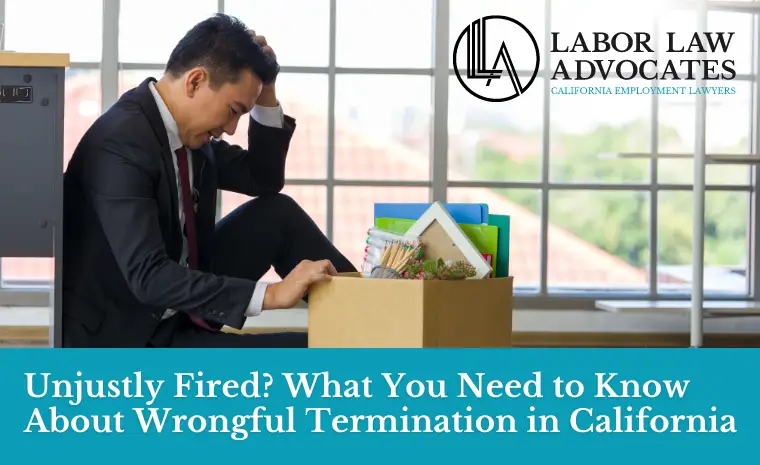If you believe that you have experienced wrongful termination in California, it is important to understand the legal protections available to you. Under California law, there are several grounds for wrongful termination, including discrimination, retaliation, breach of contract, and violation of public policy. If you suspect that your employer fired you for any of these reasons, you may have a legal claim.
Did you get unfairly fired from your job?
Find out if you are eligible to file a wrongful termination claim. Have a free consultation with us.
What is Wrongful Termination?
When an employer fires an employee in a way that goes against state or federal laws or the terms of the employment contract, it is considered wrongful termination, also known as wrongful dismissal or wrongful discharge. If an employee can prove that they were wrongfully terminated, their employer may face legal or financial consequences.
Read on to know more about the legal grounds for wrongful termination claims in California and the steps you can take if you have been wrongfully terminated.

Unjustly Fired: Understanding the Legal Basis for Wrongful Termination in California
In the state of California, there exist rules and regulations intended to protect employees from unfair dismissal by their employers. Termination of employees that violate state or federal laws, public policies, or terms of the employment contract is known as wrongful termination. Therefore, it is crucial for both employers and employees alike to be familiar with the legal aspects concerning wrongful dismissal in California to facilitate fair and unbiased employment practices.
Discrimination
Discrimination occurs when an employer treats an employee unfairly or differently because of their membership in a protected class. In California, the Fair Employment and Housing Act (FEHA) prohibits employers from firing an employee based on their race, gender, sexual orientation, religion, national origin, age, marital status, disability, medical condition, or any other protected characteristic.
To succeed in a discrimination claim, the employee must show that their protected characteristic was a motivating factor in the employer’s decision to terminate them. Additionally, the employer may attempt to provide a legitimate, non-discriminatory reason for the termination, and it will be up to the employee to prove that this reason was merely a pretext for discrimination.
Retaliation
In California, employees are protected from retaliation by their employers for engaging in certain legally protected activities. These protected activities include reporting illegal activity, participating in legal proceedings against the employer, or cooperating with a government agency investigation.
Other forms of retaliation are termination from taking a medical or family leave. It could also be termination following complaints of sexual harassment from anyone related to the worker’s employment.
Whistleblowing
Employees who report unlawful or unethical behavior by their employer or coworkers are protected by whistleblower protection laws. This means that if an employee is fired for reporting illegal activities, unsafe working conditions, or violations of public policy, they may have grounds for California’s wrongful termination lawsuit.
Breach of Contract
When an employee is fired in violation of their employment contract, it may be considered wrongful termination. Employment contracts specify the terms of the employment relationship, including the conditions under which an employee may be terminated. If an employer breaches these terms, such as by firing an employee without cause or not providing the required notice, the employee may have it as the basis for a wrongful termination lawsuit.
In these cases, the employee may seek damages for unpaid wages, benefits, and other losses resulting from the wrongful termination. It is important for both employees and employers to carefully review and understand their agreement terms to ensure that they comply with California labor law on employment contracts.
Public Policy Violations
A wrongful termination lawsuit based on the violation of public policy allows a fired employee to take legal action against their previous employer. California is an “at-will state,” meaning either party can terminate the agreement without giving a reason, this type of legal action is a limited exception to this rule.
To file a wrongful termination complaint for wrongful discharge in violation of public policy, the person filing the lawsuit must demonstrate four things.
- There must be an established public policy, as evidenced by state or federal employment laws or court decisions.
- Firing an employee in circumstances similar to those that led to the plaintiff’s dismissal must put that public policy in jeopardy.
- The dismissal must have been motivated by behavior related to the public policy in question.
- The employer must not have had a legitimate business reason for firing the employee.
What Should You Do When You’ve Been Wrongfully Terminated
Collect Evidence
When an employee believes they have been wrongfully terminated, it is crucial to gather as much evidence as possible to support their claim during the discovery process. Evidence can come in many forms, including emails, text messages, performance reviews, and witness statements.
Employees need to act quickly to gather evidence, as memories can fade and evidence can be lost over time. Employees should also make sure to keep copies of any relevant documents, such as their employment contract, company policies, and even the employee handbook as a reference.
All of this evidence can be crucial in building a strong case for wrongful termination. A qualified employment attorney can help employees understand what evidence is most relevant to their case and how best to present it in court.
File a Complaint with the Labor Board
If an employee believes they have been wrongfully terminated, they can file a complaint with the California Labor Commissioner’s Office, also known as the Division of Labor Standards Enforcement (DLSE). The DLSE is responsible for enforcing California’s labor laws, including those related to wrongful termination.
To file a complaint with the DLSE, the employee must complete and submit a form known as “DLSE Form 205,” which is available on the DLSE website. The form requires the employee to provide basic information about their employment, the reason for their termination, and any other relevant details.
The employee must also provide documentation to support their claims, such as pay stubs or correspondence with their employer.
Hire an Employment Attorney
If an employee believes they have been wrongfully terminated, hiring an experienced employment attorney can be a wise decision. Employment lawyers are legal professionals who specialize in helping employees navigate complex wrongful termination laws.
An employment attorney can help the employee understand their legal rights and options, including whether they have a strong case for wrongful discharge. The attorney can also help the employee gather evidence to support their claim, negotiate with the employer or their legal representative, and represent the employee in court if necessary.
Additionally, an employment attorney can help the employee understand the potential damages they may be entitled to, including lost wages, emotional distress damages, and punitive damages. The attorney can help the employee calculate the value of their case and ensure that they are adequately compensated for their losses.
It is important to choose an experienced employment law attorney who has a strong track record of success in unlawful discharge cases. A qualified attorney should also be familiar with California’s labor laws, particularly with the Fair Employment and Housing Act (FEMA), and have a deep understanding of the legal system.
Attend Mediation
Mediation can be a cost-effective and efficient way to resolve a dispute, as it can often lead to a mutually agreeable resolution without the need for a lengthy and expensive court battle. During mediation, both the employee and employer will have the opportunity to present their case and discuss possible solutions to the dispute.
Before attending mediation, the employee needs to provide reasonable notice of their intention to file a lawsuit or claim. This advance notice can be provided in writing to the employer or their legal representative, and should include information about the basis for the claim and the damages sought.
File a Lawsuit
If mediation is unsuccessful, you may want to file a lawsuit against your employer. An attorney can help you file the lawsuit and represent you in the courtroom if necessary. A successful lawsuit may result in damages awarded to you, as well as the possibility of reinstatement to your former position.
FAQs
1. Is it possible for me to lose my job in California without any specific reason?
No, California is an at-will employment state, but certain legal grounds for termination are prohibited by law, such as discrimination, retaliation, and violations of public policy.
2. Can I sue my employer for wrongful termination because of my health condition?
Yes, if you have been wrongfully terminated due to a health problem or disability, and have evidence to support your claim, you can file a labor lawsuit under the anti-discrimination law or FEHA against your employer.
3. What compensatory damages can I recover if I win a wrongful termination lawsuit?
If you win a wrongful termination lawsuit, you may be awarded the right compensation, such as lost wages, mental anguish, attorney fees, and punitive damages.
4. Should I try to negotiate a settlement with my employer before filing a lawsuit?
It is always a good idea to attempt to resolve the issue outside of court, but if your employer is unwilling to negotiate, filing a labor lawsuit may be necessary.
5. How long do I have to file a wrongful termination lawsuit in California?
In most cases, the statute of limitation (SOL) is two years from the date of your termination. You have to file a labor lawsuit for wrongful termination in California before the SOL ends. Consult a wrongful termination lawyer for more information on this process.
Takeaway Points To Remember About Wrongful Termination
- If you have been wrongfully terminated in California, it is important to understand your legal rights and the steps you can take to seek justice.
- Discrimination, retaliation, whistleblowing, breach of contract, and violations of public policy are all legal grounds for wrongful termination in California.
- Collecting evidence, filing a complaint with the labor board, hiring an attorney, attending mediation, and filing a lawsuit are all steps you can take if you believe you have been wrongfully terminated.
- By taking action, you can seek the justice you deserve and hold your employer accountable.
Can a law employment attorney help me?
Were you fired from your work because of your health condition or immigration status? From whistleblowing an illegal process in your company? Or from any other unlawful employment practice?
An experienced attorney can help you get proper compensation for monetary damages, non-economic damages, and punitive damages from unlawful discharge for illegal reasons. Consult with the most qualified employment attorney in California for legal advice today.
Labor Law Advocates has California’s award-winning wrongful termination attorneys who specialize in employment rights and labor laws. Speak with one of our experts for a free consultation.
We are available 24/7, so call us anytime at (424)-688-3632.




